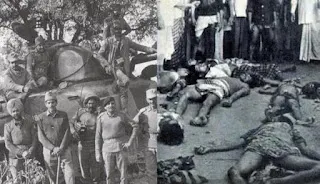Remembering the Bangladesh Liberation War: The Struggle for Independence and the Atrocities of 1971.
- Get link
- X
- Other Apps
Remembering the Bangladesh Liberation War: The Struggle for Independence and the Atrocities of 1971.
The Bangladesh Liberation War of 1971 was
a pivotal moment in the history of South Asia. The conflict was sparked
by the refusal of the government of Pakistan to recognize the results
of the 1970 elections in East Pakistan, where the Awami League, a
Bengali nationalist party, had won a majority of seats. The Pakistan
Army launched a military operation in East Pakistan, known as Operation
Searchlight, in an attempt to suppress the Bengali nationalist movement
and maintain control over the region.
The military operation led to widespread
atrocities, including mass killings, rape, and forced displacement. The
Pakistan Army targeted civilians, particularly members of the Hindu
minority, in a campaign of ethnic cleansing. The Bengali nationalist
movement, led by Sheikh Mujibur Rahman and his Awami League party,
organized resistance against the Pakistani military and formed a
provisional government-in-exile, the Mukti Bahini.
The war resulted in the deaths of an
estimated 3 million people, and the displacement of over 10 million
refugees, many of whom fled to India. The Indian government provided
military and logistical support to the Mukti Bahini, and the Indian
military intervened in the war in December 1971, leading to the
surrender of the Pakistani army and the independence of Bangladesh.
The Bangladesh Liberation War is
considered one of the most atrocious genocides of the 20th century, with
the Pakistani military and its local collaborators being responsible
for war crimes and crimes against humanity. The International Crimes
Tribunal of Bangladesh was established in 1973 to investigate and
prosecute war crimes committed during the war.
The events of the war also had a
significant impact on the region and the world. The independence of
Bangladesh marked the emergence of a new nation in South Asia, and the
war led to increased tensions between India and Pakistan, which
ultimately resulted in the creation of Bangladesh.
The Bangladesh Liberation War is a reminder of the atrocities that can
occur when a government turns against its own people and the importance
of self-determination and human rights. The resilience and bravery of
the Bengali people during the war are a testament to their struggle for
freedom and independence.
The memories of those who lost their lives, or were affected by the war, should be honored and remembered, so that the world can continue to learn from the past and prevent such atrocities from happening again.
In conclusion, the Bangladesh Liberation War of 1971 was a pivotal moment in the history of South Asia that resulted in the independence of Bangladesh. The war was sparked by the refusal of the Pakistani government to recognize the results of the 1970 elections in East Pakistan and the military operation launched by the Pakistan army to suppress the Bengali nationalist movement, which led to widespread atrocities, including mass killings, rape, and forced displacement.
The Bengali nationalist movement, led by Sheikh Mujibur Rahman and his Awami League party, organized resistance against the Pakistani military and formed a provisional government-in-exile, the Mukti Bahini. The war resulted in the deaths of an estimated 3 million people and the displacement of over 10 million refugees.
The Bangladesh Liberation War is considered one of the most atrocious genocides of the 20th century, with the Pakistani military and its local collaborators being responsible for war crimes and crimes against humanity. The memories of those who lost their lives, or were affected by the war, should be honored and remembered, so that the world can continue to learn from the past and prevent such atrocities from happening again.
- Get link
- X
- Other Apps













.png)
Comments
Post a Comment